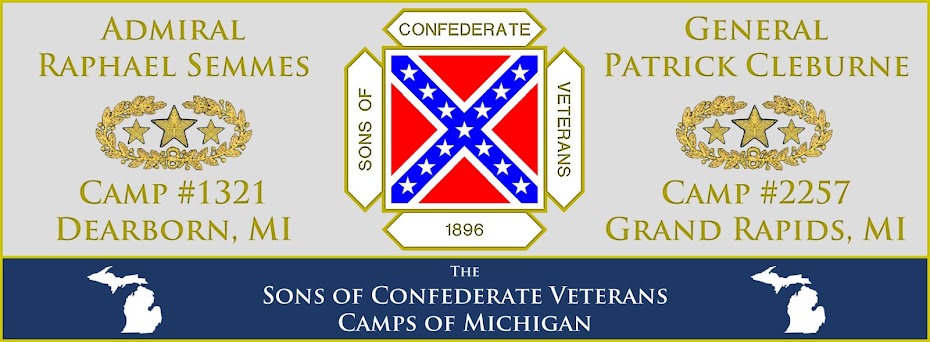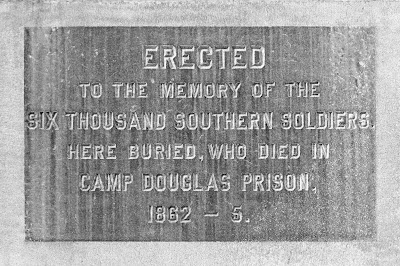[In 'Part 1' of this post, I discussed why there are around 6,000 Confederate soldiers buried in Chicago, and how the monument at Oak Woods Cemetery came to be. If you have not read it, you can go to it by clicking HERE.]
***PRIOR TO THE EVENT***
The annual observance held by the Illinois SCV was scheduled to be held on April 22, 2018, and the date was set well in advance. The information regarding the location, date & time was also made public on social media.
On Thursday, April 5th (17 days before the Confederate Memorial Service at Oak Woods), news broke that a coalition of self-proclaimed "anti-racist organizations and individuals" was planning to protest the ceremony; furthermore, this group is calling for the removal of the grave-marker that stands over the mass-grave site containing the remains of nearly 6,000 Confederate prisoners of war, and for it to be replaced with a monument for Ida B. Wells (an African-American investigative journalist, educator, feminist, and early leader in the Civil Rights Movement), who is buried in a different section of the very large cemetery.
 |
| The location of Confederate Mound within Oak Woods Cemetery |
The very thought or idea that anyone would protest a memorial service at the mass-grave of American military veterans is beyond the pall. Thankfully, the monument and the gravesite that it marks is under the protection of the federal government, through the U.S. Dept. of Veterans Affairs & the National Cemetery Administration. The proper authorities were alerted by Cmdr. Evans to insure that this memorial service could be conducted in peace and that the gravesite (and all monuments & ornamentation pertaining to it) would be protected from anyone who might seek to damage or desecrate it in any way.
 |
| Confederate Mound at Oak Woods Cemetery (Image Credit: SCV Camp #1321) |
The Michigan contingent that made the trip out to Chicago on April 22 consisted of the following:
(Camp #1321) Cmdr. Darron Williams, 1st Lt.Cmdr. George Calder & 2nd Lt.Cmdr. Jonathan McCleese; (Camp #2257) Cmdr. Jim Perkins, Adj. Duane Peachey & Robert Fragala.
 |
| The Memorial at Confederate Mound (Image Credit: SCV Camp #1321) |
***ARRIVAL AT OAK WOODS***
 |
| Cmdr. Darron Williams paying his respects (Image Credit: SCV Camp #1321) |
Upon our arrival back to the cemetery shortly after 10:00 a.m. (CST), we found that protestors had arrived and were hanging around at the cemetery entrance and that there were plenty law enforcement officers on hand to keep an eye on the day's events. We drove back to the monument to find that there were also plenty of people there to honor the brave Southern soldiers buried there, plus more law-enforcement officers and a smattering of folks from the media. The hour before the service was spent talking to new friends that we were meeting, many of them compatriots in the SCV and some being descendants of men who were buried in the mound. It was a pleasure to connect with them all.
***THE CEREMONY***
The ceremony began shortly after 11:00 a.m. (CST) with greetings and an introduction from Jim Barr, Commander of the Illinois Division of the Sons of Confederate Veterans. Cmdr. Barr then continued by giving a brief history of the Confederate Mound Memorial at Oak Woods Cemetery before reading from the Order for the Burial of the Dead of the Protestant Episcopal Church in the Confederate States of America.
 |
| Jim Barr, Commander of the SCV's Illinois Division (Image Credit: SCV Camp #1321) |
We're not here today to debate causes of the "civil war"; those can be found in a book, preferably outside of a high school or college class. We gather here today to pay honor to these men behind me, who suffered and died in a land foreign to them.
Not much is known about Camp Douglas and the impact it had on a Confederate soldier. This mound behind me - that shows the impact [that] Camp Douglas had on them. Old men, young men, fathers & sons from all kinds of backgrounds passed through the gates of Camp Douglas. This mound is the only thing left of them. It's no monument; it's a memorial - it's a headstone. The soldier fixed atop of that column you see there watches over these men.
 |
| Matthew Evans, Cmdr. of SCV Camp #516 (Image Credit: SCV Camp #516) |
[On] April 15, 1861, Lincoln called up 75,000 men to invade the independent Southern states. This act prompted the states of Virginia, North Carolina, Tennessee & Arkansas to secede, joining the newly formed country - The Confederate States of America. This began the bloodiest war in our country's history. Southern states called upon their sons, some who lie here with us today, to do their duty to defend their state, their homes and their families. These men went to do their duty, not as aggressors or in the spirit of conquest. Despite the hardships endured by the Confederate soldier, they continued to do their duty; despite it all the Confederate soldier prevailed in most major conflicts, even if victory was not at hand.Cmdr. Evans then stepped away from the speakers position and stood beside the honor guard as they fired a gun salute.
Nearly 258,000 Confederate soldiers would die on the field of battle, in hospitals, and POW camps, like Camp Douglas. They died protecting what they loved the most - family. They fought bravely and nobly against overwhelming forces & odds; they suffered hardships that many of us will never know or experience today. They were called to do their duty as Americans, as fathers, as sons, brothers and loved ones, serving without hesitation.
What we owe these men today, and the many thousands of Confederate soldiers buried across this country, is to make sure the truth is told, not only about the war, but of their struggles.
NO ONE SHOULD HAVE TO FIGHT FROM THEIR GRAVE. Today, their voice is now our voice. These soldiers aren't just names on a board or on a headstone; they're our ancestors... our heroes... a piece of our family. Without hesitation or question, all of these men deserve respect, honor & dignity from each one of us today. DEO VINDICE!
 |
| The Confederate Memorial Guard (Image Credit: SCV Camp #1321) |
 |
| Harry Reineke IV [Past Commander, Camp #516] & Michael Pierpoint [1st Lt.Cmdr. of the IL Div. SCV] (Image Credit: SCV Camp 1321) |
***THE PROTEST***
As it regards the efforts of those who had stated their intention to "protest" the memorial service, it was a total failure. According to the media, there were about 50 protesters in total and about 40 on hand to honor the Confederate's buried there. Thanks to the efforts of law-enforcement on hand to keep the peace & the federal authorities on hand to protect their property, we almost did know that the protesters were there. We left the cemetery as safely as we'd entered it, driving right past our "opposition" on the way out. There were several stories about it all in the local media the next day, and I'm sure that they were disappointed in the lack of controversy.
 |
| Past-Commander Reineke with the Michigan SCV Compatriots (Image Credit: SCV Camp #516) |
***CONCLUSION***
Our goal on that Sunday morning was to honor our brave men & boys in gray who paid the ultimate price in a land far from home as prisoners of war, and do so in peace; we had no intention of offending or harming anyone in any way. Despite what some (the media & the workers of hate & division) may have hoped for, with thanks to God we can say that we won the day because the ceremony went off without a hitch and everyone was able to go home without any incident.
The praiseworthy efforts of Cmdr. Matthew Evans cannot be overstated. His calm, yet firm resolve and level-headed decision making during such a time are largely the reason that this all played out as it did. He is a credit to the organization, and it was a pleasure to meet him and to serve under his direction in support of the Illinois Division & Camp #516 that day.
On behalf of the Michigan compatriots who attended, many thanks go out to the IL Division & Camp #516 for the hospitality that they showed to us - before, during & after the event. It was our honor to be a small part of the wonderful ceremony they put on and, if the Lord is willing, we'll get to serve with them again in the future.
DEO VINDICE!
- Jonathan McCleese
2nd Lieutenant Commander
Admiral Raphael Semmes Camp #1321 (Dearborn, MI)
Army of Tennessee, Sons of Confederate Veterans




































